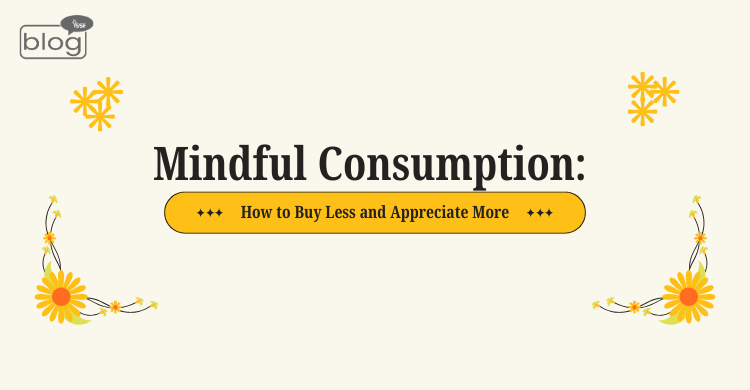In our busy world of constant promotion and unlimited commodities, too many of us are stuck in cycles of acquisition without satisfaction. The sirens’ song of bliss via consumption is impossible to resist but often emptiness. Conscious consumption offers an alternative model—one that is based on mindfulness, gratitude, and stewardship. Let us learn to buy less yet find more happiness in what we have.
Get in Touch with the Why Behind Your Spending
Before you buy, pause and reflect: Why do I want this? Is it because you genuinely need it, or are you buying it because you’re accustomed to purchasing it, bored, or keeping up with the times? All too often, we shop to fill an emotional void or keep up with the fashion, only to find later that the purchase doesn’t add value to our life. By discovering what motivates your shopping, you can start to differentiate between needs and wants. This small exercise in self-awareness can avoid impulse buying and result in more conscious decisions.
Practice Gratitude for What You Already Have
Gratitude for what you already have is one of the support pillars of mindful consumption. Just take a moment to look around your home and be thankful for the things that function for you. Your warm sweater, reliable kitchen appliance, or that book that inspired you are examples. Gratitude makes you shift your focus from what you do not have to what you have. When you practice gratitude, you won’t be so inclined to go out and acquire more. Instead, you’ll enjoy using and appreciating the things you already possess. Suppose Implement an individual cooling-off period before indulging in discretionary spending—possibly 24 hours for trivial goods and 30 days for substantial ones. This waiting time allows the original exhilaration to wane, testing whether you essentially require or simply desire the commodity.
Finding Happiness in Less
The vast majority of people who practice mindful consumption report feeling lighter, both physically and mentally. There’s something magical about transcending the endless cycle of want and hoarding. When there is less stuff competing for our attention, we are better positioned to truly enjoy what we choose to keep. Consider Marie Kondo’s famous question: “Does it spark joy?” This minimalist standard redirects our focus from accumulation to a positive relationship with possessions. If all that you own truly delights you or has a clear function, your life is changed in terms of the relationship with objects.
Embrace Quality Over Quantity.
It’s tempting in a culture of fast fashion and throwaway products to prioritize quantity over quality. But cheap, shoddy products break easily, creating more waste and more money spent in the long run. Conscious consumption encourages spending money on well-made, durable products that endure. When you choose quality over quantity, you not only save money but also reduce your carbon footprint. And having fewer, high-quality products can provide you with a sense of pride and satisfaction that mass-produced products simply can’t match.
Support ethical and sustainable brands
Conscious consumption is also about considering the impact of your purchases on the world and other people. Patronize brands that practice ethical labor, use sustainable resources, and have transparent supply chains. Such products may cost more, but they typically reflect the true cost of ethical production. When you buy from ethical brands, you’re not just purchasing a product—you’re voting with your dollars for a better world. This intention can make shopping more rewarding and satisfactory.
Starting Your Mindful Eating Journey
Start small. Try a shopping-free weekend, or challenge yourself to a month of bare necessities only. Keep a diary of your shopping cravings and analyze what triggers them. Write a wishlist of things you want and revisit it every now and then—often the craving goes away with time.
Remember that mindful consumption is a practice, not perfection. There will be impulse purchases and regretful indulgences. If and when this happens, reflect without judgment and reaffirm your intentions.
In a culture that equates success with stuff and identity with brands, choosing mindful consumption is quietly revolutionary. It’s an assertion that our worth is not measured by what we own, and our satisfaction is not to be discovered in shopping carts—virtual or otherwise.
By wanting less and appreciating more, we restore our power as conscious consumers while developing a more sustainable and meaningful relationship with the material world around us.
To read these types of blogs, click here.
Writer
Nayela Binte Azad
Intern, Content Writing Department
YSSE

